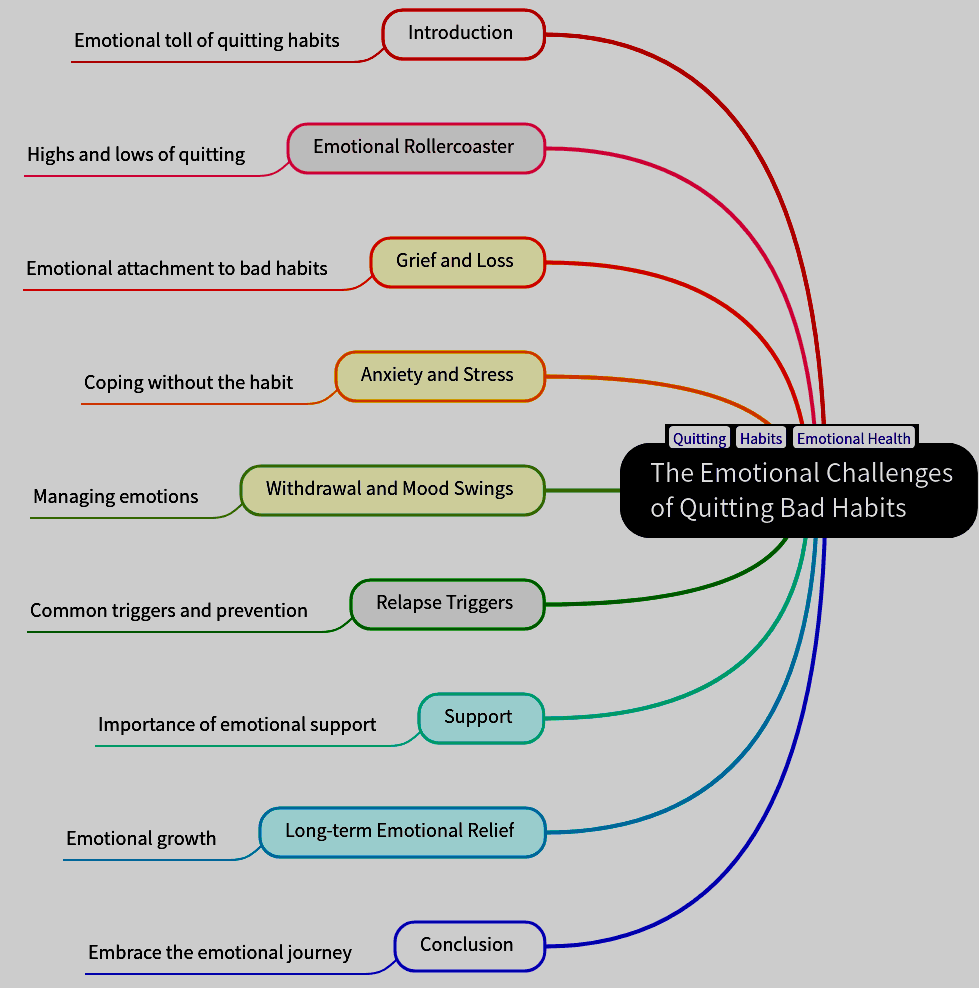
Emotional Challenges of Quitting Bad Habits: What No One Tells You
Quitting bad habits is never easy. Whether it's smoking, overeating, or procrastination, breaking free from a long-standing habit often feels like an uphill battle. While many guides offer tips on how to stop these behaviors, the emotional challenges that come with quitting are rarely discussed. Yet, these emotional hurdles are often what make quitting a habit so difficult. This article will explore the lesser-known emotional aspects of quitting bad habits and provide insights to help you manage the emotional toll that comes with it.

The Hidden Emotional Rollercoaster of Quitting Bad Habits
Breaking a bad habit is more than just overcoming the physical or behavioral aspects. It’s about confronting the emotions tied to that habit. Whether you're quitting smoking, giving up junk food, or stopping procrastination, the emotional strain is often the hardest part.
Many people fail to anticipate the emotional highs and lows that accompany quitting. They may experience feelings of loss, frustration, and even grief. These emotions can make it seem like the bad habit was a crucial part of their life, and giving it up leaves a void. This emotional rollercoaster often becomes a stumbling block on the road to successful change.

Grief and Loss: Saying Goodbye to Your Comfort Zone
When people give up a habit, they often feel a sense of grief. This may seem strange, but it makes sense when you consider that habits, even bad ones, often serve as coping mechanisms. Smoking, for example, might have been a way to relax during stressful times, while overeating could have been a source of comfort during emotional lows.
When you quit these habits, you’re not just stopping a behavior; you’re also giving up a source of emotional comfort. As a result, feelings of loss and grief can arise, which can be surprisingly intense. This sense of loss can leave people feeling empty and unsure of how to cope with stress or difficult emotions.
Anxiety and Stress: Facing Life Without Your Crutch
One of the most common emotional challenges when quitting bad habits is anxiety. Bad habits often act as crutches that help people manage stress or anxiety in their daily lives. When those crutches are taken away, the underlying anxiety often rises to the surface.
For example, if someone smokes to deal with work-related stress, quitting may initially make them feel more stressed and anxious. The habit may have masked the stress, and without it, they are left to confront their emotions head-on.
The key to managing this anxiety is to find healthier coping mechanisms. Mindfulness techniques, exercise, and deep breathing exercises can all help manage the anxiety that comes with quitting. It’s important to remember that anxiety is a temporary emotion that will pass as your brain adjusts to the new reality.
Withdrawal and Mood Swings: The Physical and Emotional Toll
The emotional challenges of quitting bad habits often go hand-in-hand with physical symptoms. Withdrawal symptoms, especially from addictive substances like nicotine or sugar, can cause intense mood swings. Irritability, anger, and sadness are all common emotions that arise during the withdrawal phase.
Mood swings can make the quitting process feel unbearable, leading many people to relapse. It’s important to be aware of these emotional changes so that you can prepare for them. Having a plan in place for how to deal with these emotions can make all the difference in staying on track.
For example, journaling about your emotions or talking to a friend or therapist can help release some of the pent-up frustration. Sometimes, simply acknowledging that mood swings are part of the process can make them easier to handle.
Relapse Triggers: Emotional Setbacks Along the Way
Emotional triggers are one of the biggest challenges when quitting bad habits. These triggers can take many forms—stress, social pressure, or boredom—and they often lead to relapse. Recognizing your emotional triggers and developing strategies to cope with them is essential to staying on track.
Stress, in particular, is a powerful trigger for relapse. Many people revert to their old habits when they feel overwhelmed or anxious. Identifying the situations that trigger your stress and learning healthier ways to cope is crucial.
For instance, instead of reaching for a cigarette when stressed, try taking a walk, practicing mindfulness, or talking to someone about what’s bothering you. Over time, these healthier coping strategies will become more natural, and the emotional triggers will have less power over you.
The Importance of Support: You Don’t Have to Go Through It Alone
One of the most overlooked emotional challenges of quitting bad habits is the feeling of isolation. Many people feel that they are going through the process alone, which can lead to emotional distress and a greater chance of relapse.
Having a support system in place can make a significant difference in overcoming the emotional hurdles. Whether it’s friends, family, or support groups, having people to lean on during difficult moments can provide the emotional resilience needed to stick with the change.
Support groups, in particular, can be beneficial because they allow you to connect with others going through the same process. Sharing your struggles and hearing how others are dealing with their emotional challenges can be incredibly empowering.
Long-term Emotional Relief: The Light at the End of the Tunnel
While the emotional challenges of quitting bad habits are intense, they are also temporary. As you stick with your decision to quit, the emotional strain begins to lessen, and the sense of accomplishment starts to grow. Over time, you will likely feel emotionally stronger and more in control of your life.
Breaking a bad habit is one of the most empowering things you can do for yourself. It teaches you that you have control over your life and your choices. This emotional growth is one of the greatest rewards of quitting bad habits, and it’s something that will continue to benefit you long after the habit is gone.
Common Emotional Triggers and How to Overcome Them
-
Stress: Stress is one of the most common emotional triggers for relapse. When stress hits, many people turn to their old habits for comfort. To overcome this, practice relaxation techniques such as deep breathing, meditation, or yoga to manage your stress levels.
-
Boredom: Habits often fill the gaps in our lives. When you’re bored, you might feel tempted to return to your old habits. To counter boredom, find new hobbies or activities that can occupy your time and energy.
-
Social Pressure: Friends and family can sometimes, unintentionally, pressure you into returning to your bad habits. Whether it’s being offered a cigarette at a party or being encouraged to indulge in unhealthy food, social pressure can be challenging. Be firm with your decision and, if necessary, distance yourself from situations that might trigger a relapse.
-
Negative Emotions: Feelings of sadness, anger, or frustration can often trigger the desire to return to bad habits. Instead of turning to the habit, try to process these emotions in healthier ways, such as talking to a trusted friend or engaging in a calming activity like reading or taking a walk.
Conclusion:
Quitting bad habits isn’t just about willpower or making physical changes. It’s an emotional journey filled with challenges that are often overlooked. From the feelings of grief and loss to the anxiety and stress that surface when you give up your crutch, the emotional toll of quitting can be overwhelming.
However, by understanding these emotional challenges and developing strategies to cope with them, you can navigate this journey with greater success. Remember, the emotional hurdles are temporary, and with time, you will feel stronger, more empowered, and in control of your life.
Breaking bad habits is not only about removing a negative behavior but also about building emotional resilience. You are stronger than your habits, and with the right support and mindset, you can overcome any emotional challenges that come your way.
Motivational Topics




